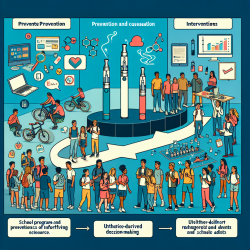Empowering Change: Harnessing Research to Combat Youth E-Cigarette Use
In recent years, the rise of e-cigarette use among youth has become a significant public health concern. Schools are uniquely positioned to influence youth behavior through targeted interventions. A recent study, "Evaluating the One-Year Impact of School e-Cigarette Use Interventions among Current Youth e-Cigarette Users in the COMPASS Study, 2017/18–2018/19," provides valuable insights into the effectiveness of these interventions.
Understanding the Study
The study utilized data from the COMPASS study, involving 3,586 current e-cigarette users across 90 schools in Canada. Schools were categorized into intervention and control groups based on whether they implemented new e-cigarette prevention or cessation programs. The study aimed to evaluate the impact of these programs on youth e-cigarette use patterns over one year.
Key Findings
- Approximately one-quarter of schools added new e-cigarette prevention or cessation programs.
- The study found no significant differences in the odds of escalating or reducing e-cigarette use between intervention and control schools.
- Protection programs showed the most promise in influencing positive changes in e-cigarette use patterns.
Implications for Practitioners
Despite the limited impact observed, the study highlights several important considerations for practitioners:
- Program Design: Effective interventions may require a comprehensive approach that includes education, protection, and cessation components.
- Data-Driven Decisions: Practitioners should leverage data to refine and adapt programs to better meet the needs of current e-cigarette users.
- Long-Term Commitment: Longitudinal studies and extended follow-up periods are essential to fully understand the impact of interventions.
Encouraging Further Research
The study underscores the need for additional research to develop and evaluate effective e-cigarette cessation programs. Practitioners are encouraged to engage in collaborative research efforts to explore innovative strategies and share best practices.
Conclusion
While the current study did not find significant changes in e-cigarette use patterns, it provides a foundation for future research and program development. By leveraging data-driven insights and fostering collaboration, we can empower schools to create healthier environments for youth.
To read the original research paper, please follow this link: Evaluating the One-Year Impact of School e-Cigarette Use Interventions among Current Youth e-Cigarette Users in the COMPASS Study, 2017/18–2018/19.










